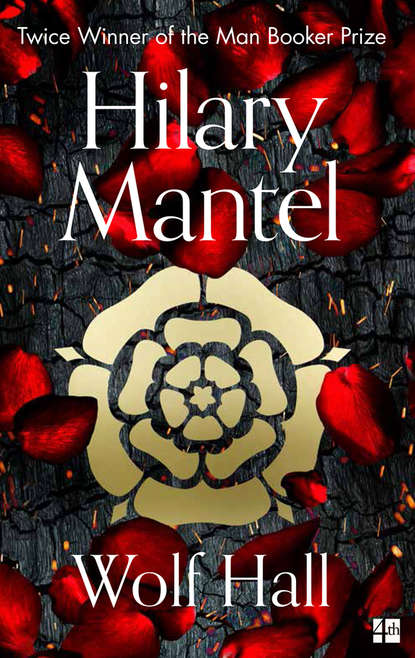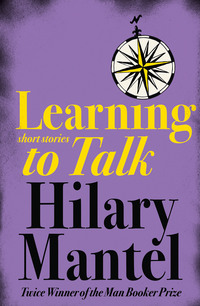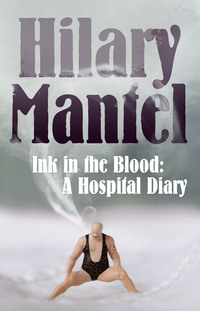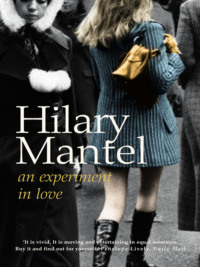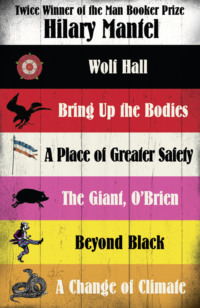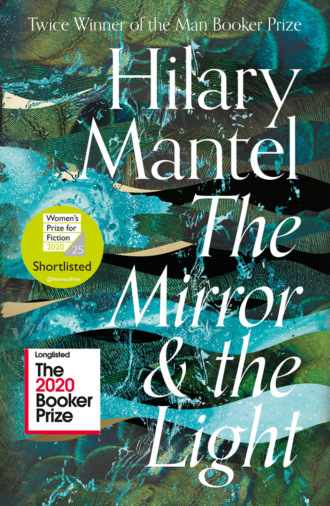
Полная версия
The Mirror and the Light


Dedication
To Mary Robertson,
in honour of enduring friendship
Contents
1 Cover
2 Title Page
3 Copyright
4 Dedication
5 Cast of Characters
6 Family Trees
7 Epigraph
8 PART ONE
9 I Wreckage (I). London, May 1536
10 II Salvage. London, Summer 1536
11 III Wreckage (II). London, Summer 1536
12 PART TWO
13 I Augmentation. London, Autumn 1536
14 II The Five Wounds. London, Autumn 1536
15 III Vile Blood. London, Autumn–Winter 1536
16 PART THREE
17 I The Bleach Fields. Spring 1537
18 II The Image of the King. Spring–Summer 1537
19 III Broken on the Body. London, Autumn 1537
20 PART FOUR
21 I Nonsuch. Winter 1537– Spring 1538
22 II Corpus Christi. June–December 1538
23 III Inheritance. December 1538
24 PART FIVE
25 I Ascension Day. Spring–Summer 1539
26 II Twelfth Night. Autumn 1539
27 III Magnificence. January–Hune 1540
28 PART SIX
29 I Mirror. June–July 1540
30 II Light. 28 July 1540
31 Epitaph
32 Author’s Note
33 Acknowledgements
34 Also by Hilary Mantel
35 About the Author
36 About the Publisher
LandmarksCoverFrontmatterStart of ContentBackmatter
List of Pagesiiiivvixxxixiixiiixivxvxvixvii134567891011121314151617181920212223242527282930313233343536373839404142434445464748495051525354555657585960616263646566676869707172737475767778798081828384858687888990919293949596979899100101102103104105106107108109110111112113114115116117118119120121122123124125126127128129130131132133134135136137138139140141142143144145146147148149150151152153154155156157158159160161162163164165167168169170171172173174175176177178179180181182183184185186187188189190191192193194195196197198199200201202203204205206207208209210211212213214215216217218219220221222223224225226227228229230231232233234235236237238239240241242243244245246247248249250251253255256257258259260261262263264265266267268269270271272273274275276277279280281282283284285286287288289290291292293294295296297298299300301302303304305306307308309310311312313314315316317318319320321322323324325326327328329330331332333334335336337338339340341342343344345346347348349350351352353354355356357358359360361362363364365366367368369370371372373374375376377378379380381382383384385386387388389390391392393394395397399400401402403404405406407408409410411412413414415416417418419420421422423424425426427428429430431432433434435437438439440441442443444445446447448449450451452453454455456457458459460461462463464465466467468469470471472473474475476477478479480481482483484485486487488489490491492493494495496497498499500501502503504505506507508509510511512513514515516517518519520521523524525526527528529530531532533534535536537538539540541542543544545546547548549550551552553554555556557558559560561562563564565566567568569570571572573574575576577578579580581582583584585586587588589590591592593594595596597598599600601602603604605606607608609610611612613614615616617619620621622623624625627629630631632633634635636637638639640641642643644645646647648649650651652653654655656657658659660661662663664665666667668669670671672673674675676677678679680681682683684685686687688689690691692693694695696697698699700701702703704705706707708709710711712713714715716717718719720721722723724725726727728729730731732733734735736737738739740741742743744745746747748749750751752753754755756757758759760761762763764765766767768769770771772773774775776777778779780781782783784785786787788789790791792793794795796797798799800801802803804805806807809810811812813814815816817818819820821822823824825826827828829830831832833834835836837838839840841842843844845846847848849850851852853854855856857858859860861862863864865866867869870871872873874875877879880881882883ii
Cast of Characters
The recently dead
Anne Boleyn, Queen of England.
Her supposed lovers:
George Boleyn, Viscount Rochford, her brother.
Henry Norris, chief of the king’s privy chamber.
Francis Weston and William Brereton, gentlemen in the king’s circle.
Mark Smeaton, musician.
The Cromwell household
Thomas Cromwell, later Lord Cromwell, Secretary to the king, Lord Privy Seal, and Vicegerent in Spirituals: that is, the king’s deputy in the English church.
Gregory, his son, only surviving child of his marriage to Elizabeth Wyks.
Mercy Prior, his mother-in-law.
Rafe Sadler, his chief clerk, brought up within the family: later in the king’s household.
Helen, Rafe’s wife.
Richard Cromwell, his nephew, married to Frances Murfyn.
Thomas Avery, household accountant.
Thurston, chief cook.
Dick Purser, keeper of the guard dogs.
Jenneke, Cromwell’s daughter. (Invented character)
Christophe, a servant. (Invented character)
Mathew, a servant, formerly of Wolf Hall. (Invented character)
Bastings, the bargemaster. (Invented character)
The king’s family and household
Henry VIII.
Jane Seymour, his third wife.
Edward, her infant son, born 1537: heir to the throne.
Henry Fitzroy, Duke of Richmond: Henry’s illegitimate son by Elizabeth Blount; married to Mary Howard, daughter of the Duke of Norfolk.
Mary, Henry’s daughter by Katherine of Aragon: excluded from the succession after her parents’ marriage is declared invalid.
Elizabeth, Henry’s infant daughter by Anne Boleyn: excluded from the succession after his second marriage is declared invalid.
Anna, sister of Duke Wilhelm of Cleves: Henry’s fourth wife.
Katherine Howard, maid of honour to Anna: Henry’s fifth wife.
Margaret Douglas, Henry’s niece: daughter of the king’s sister Margaret by her second husband, Archibald Douglas, Earl of Angus; brought up at Henry’s court.
William Butts, physician.
Walter Cromer, physician.
John Chambers, physician.
Hans Holbein, artist.
Sexton, known as ‘Patch’: a jester, formerly in Wolsey’s household.
The Seymour family
Edward Seymour, eldest son, married to Anne (Nan) Stanhope.
Lady Margery Seymour, his mother.
Thomas Seymour, his younger brother.
Elizabeth, his sister, widow of Sir Anthony Oughtred, later married to Gregory Cromwell.
Politicians and clergy
Thomas Wriothesley, known as Call-Me-Risley, Clerk of the Signet: former protégé of Gardiner, later attached to Cromwell.
Stephen Gardiner, Bishop of Winchester, ambassador to France: formerly Cardinal Wolsey’s Secretary, later the Secretary to the king, displaced by Cromwell.
Richard Riche, Speaker of the House of Commons, Chancellor of the Court of Augmentations.
Thomas Audley, Lord Chancellor.
Thomas Cranmer, Archbishop of Canterbury.
Robert Barnes, a Lutheran cleric.
Hugh Latimer, reformist Bishop of Worcester.
Richard Sampson, Bishop of Chichester, a canon lawyer and conservative.
Cuthbert Tunstall, Bishop of Durham, formerly Bishop of London.
John Stokesley, conservative Bishop of London, associate of the executed Thomas More.
Edmund Bonner, ambassador to France after Gardiner, Bishop of London after Stokesley.
John Lambert, reformist priest, convicted of heresy and burned 1538.
Courtiers and aristocrats
Thomas Howard, Duke of Norfolk.
Henry Howard, his son, Earl of Surrey.
Mary Howard, his daughter, married to Fitzroy, the king’s illegitimate son.
Thomas Howard, his half-brother, known as Tom Truth.
Charles Brandon, Duke of Suffolk, old friend of Henry, widower of Henry’s sister Mary.
Thomas Wyatt, friend of Cromwell: poet, diplomat, supposed lover of Anne Boleyn.
Henry Wyatt, his aged father, an early supporter of the Tudor regime.
Bess Darrell, Wyatt’s mistress, formerly a lady-in-waiting to Katherine of Aragon.
William Fitzwilliam, later Lord Admiral and Earl of Southampton: initially an ally of Cromwell.
Nicholas Carew, prominent courtier and supporter of Mary, the king’s daughter.
Eliza Carew, his wife, sister of Francis Bryan.
Francis Bryan, known as ‘the Vicar of Hell’, an inveterate gambler and undiplomatic diplomat: brother-in-law to Nicholas Carew.
Thomas Culpeper, gentleman attending the king.
Philip Hoby, gentleman attending the king.
Jane Rochford, lady-in-waiting, widow of the executed George Boleyn.
Thomas Boleyn, Earl of Wiltshire, father of Anne Boleyn and George Boleyn.
Mary Shelton, cousin of Anne Boleyn and former lady-in-waiting.
Mary Mounteagle, lady-in-waiting.
Nan Zouche, lady-in-waiting.
Katherine, Lady Latimer, born Katherine Parr.
Henry Bouchier, Earl of Essex.
The household of the king’s children
John Shelton, governor of the household of the king’s two daughters.
Anne Shelton, his wife, aunt of Anne Boleyn.
Lady Bryan, mother of Francis Bryan and Eliza Carew: brings up the king’s daughters, Mary and Elizabeth, and later the child Edward.
At the convent in Shaftesbury
Elizabeth Zouche, the abbess.
Dorothea Wolsey, known as Dorothea Clancey, illegitimate daughter of the cardinal.
Henry’s dynastic rivals
Henry Courtenay, Marquis of Exeter, descended from a daughter of Edward IV.
Gertrude, his wife.
Margaret Pole, Countess of Salisbury, niece of Edward IV.
Henry Lord Montague, her eldest son.
Reginald Pole, her son, abroad: proposed leader of a crusade to bring England back to papal control.
Geoffrey Pole, her son.
Constance, Geoffrey’s wife.
Diplomats
Eustache Chapuys, London ambassador of Emperor Charles V: a French-speaker from Savoy.
Diego Hurtado de Mendoza, an envoy from the Emperor.
Jean de Dinteville, a French envoy.
Louis de Perreau, Sieur de Castillon, French ambassador.
Antoine de Castelnau, Bishop of Tarbes, French ambassador.
Charles de Marillac, French ambassador.
Hochsteden, envoy from Cleves.
Olisleger, envoy from Cleves.
Harst, envoy from Cleves.
In Calais
Lord Lisle, Lord Deputy, the governor, the king’s uncle.
Honor, his wife.
Anne Bassett, one of Honor’s daughters by her first marriage.
John Husee, member of the Calais garrison, the Lisles’ man of business.
At the Tower of London
Sir William Kingston, councillor to the king, Constable of the Tower.
Edmund Walsingham, Lieutenant of the Tower, Kingston’s deputy.
Martin, a gaoler. (Invented character)
Cromwell’s friends
Humphrey Monmouth, London merchant: formerly imprisoned for sheltering William Tyndale, the translator of the Bible into English.
Robert Packington, merchant and member of Parliament.
Stephen Vaughan, Antwerp-based merchant.
Margaret Vernon, an abbess, formerly Gregory’s tutor.
John Bale, a renegade monk and playwright.
Family Trees
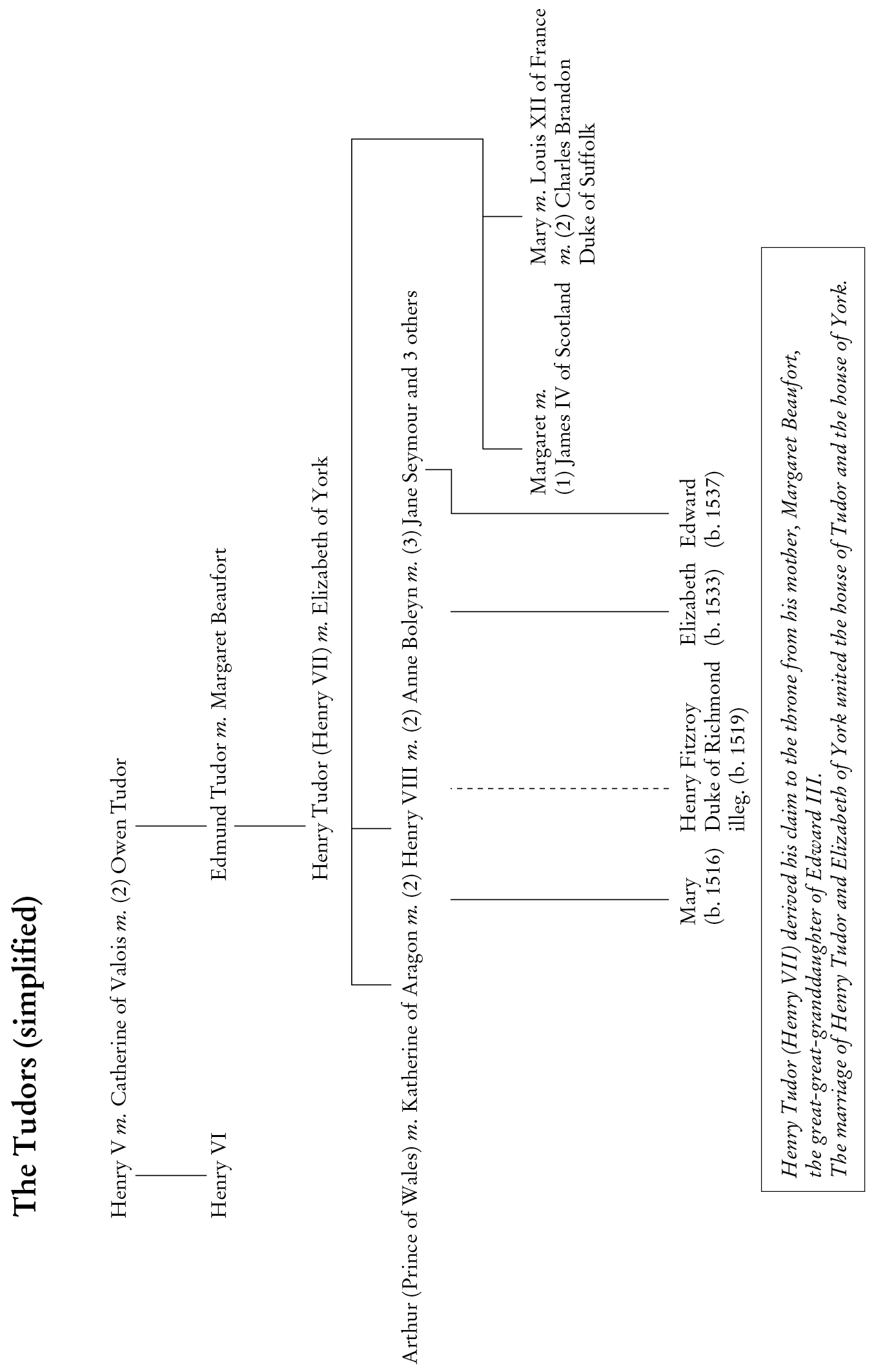
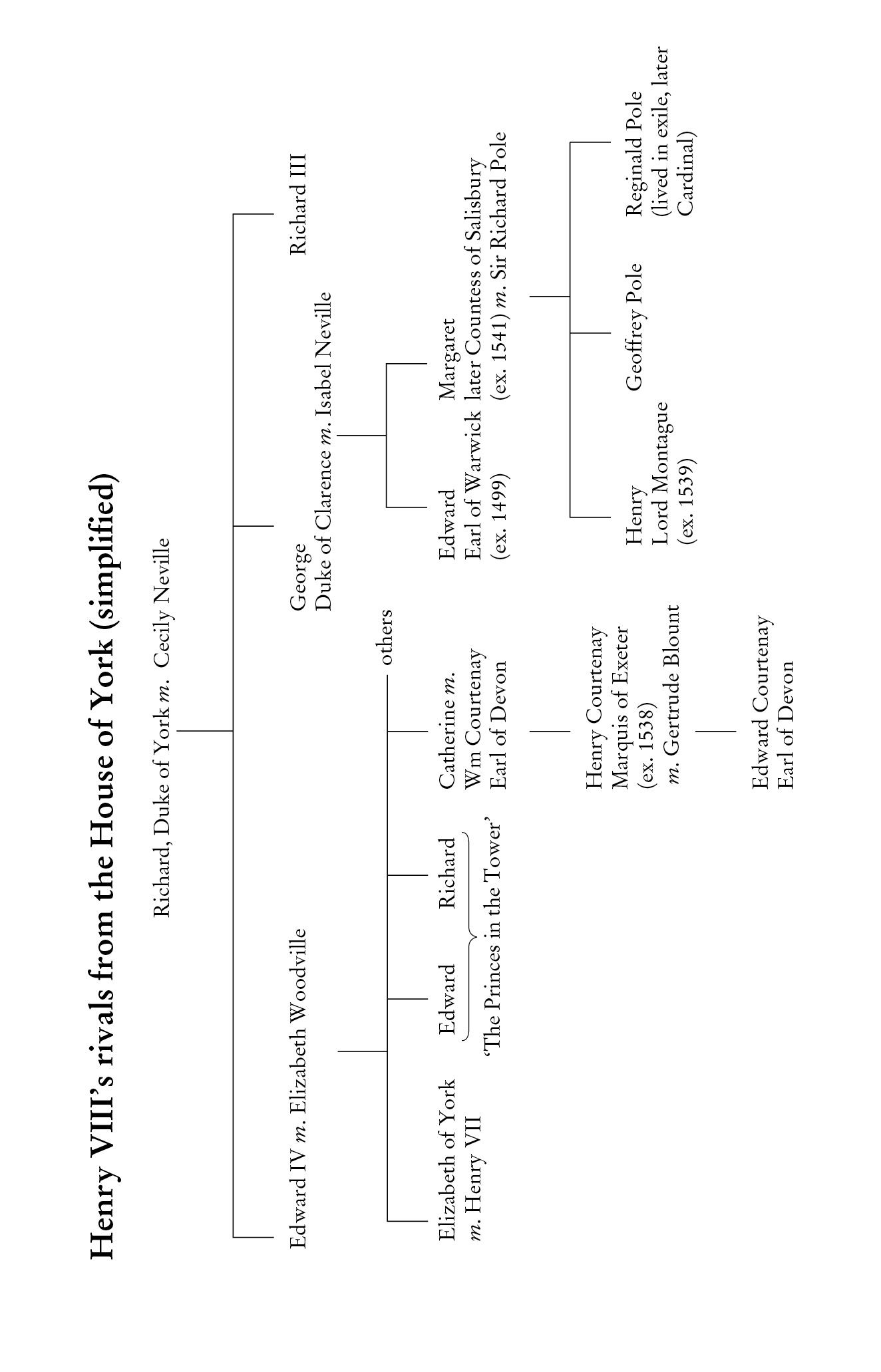
Epigraph
Frères humains qui après nous vivez
N’ayez les cuers contre nous endurciz.
Brother men, you who live after us,
Do not harden your hearts against us.
FRANÇOIS VILLON
Look up and see the wind,
For we be ready to sail.
Noah’s Flood, A MIRACLE PLAY
I
Wreckage (I)
London, May 1536
Once the queen’s head is severed, he walks away. A sharp pang of appetite reminds him that it is time for a second breakfast, or perhaps an early dinner. The morning’s circumstances are new and there are no rules to guide us. The witnesses, who have knelt for the passing of the soul, stand up and put on their hats. Under the hats, their faces are stunned.
But then he turns back, to say a word of thanks to the executioner. The man has performed his office with style; and though the king is paying him well, it is important to reward good service with encouragement, as well as a purse. Having once been a poor man, he knows this from experience.
The small body lies on the scaffold where it has fallen: belly down, hands outstretched, it swims in a pool of crimson, the blood seeping between the planks. The Frenchman – they had sent for the Calais executioner – had picked up the head, swaddled it in linen, then handed it to one of the veiled women who had attended Anne in her last moments. He saw how, as she received the bundle, the woman shuddered from the nape of her neck to her feet. She held it fast though, and a head is heavier than you expect. Having been on a battlefield, he knows this from experience too.
The women have done well. Anne would have been proud of them. They will not let any man touch her; palms out, they force back those who try to help them. They slide in the gore and stoop over the narrow carcass. He hears their indrawn breath as they lift what is left of her, holding her by her clothes; they are afraid the cloth will rip and their fingers touch her cooling flesh. Each of them sidesteps the cushion on which she knelt, now sodden with her blood. From the corner of his eye he sees a presence flit away, a fugitive lean man in a leather jerkin. It is Francis Bryan, a nimble courtier, gone to tell Henry he is a free man. Trust Francis, he thinks: he is a cousin of the dead queen, but he has remembered he is also a cousin of the queen to come.
The officers of the Tower have found, in lieu of a coffin, an arrow chest. The narrow body fits it. The woman who holds the head genuflects with her soaking parcel. As there is no other space, she fits it by the corpse’s feet. She stands up, crossing herself. The hands of the bystanders move in imitation, and his own hand moves; but then he checks himself, and draws it into a loose fist.
The women take their last look. Then they step back, their hands held away from them so as not to soil their garments. One of Constable Kingston’s men proffers linen towels – too late to be of use. These people are incredible, he says to the Frenchman. No coffin, when they had days to prepare? They knew she was going to die. They were not in any doubt.
‘But perhaps they were, Maître Cremuel.’ (No Frenchman can ever pronounce his name.) ‘Perhaps they were, for I believe the lady herself thought the king would send a messenger to stop it. Even as she mounted the steps she was looking over her shoulder, did you see?’
‘He was not thinking of her. His mind is entirely on his new bride.’
‘Alors, perhaps better luck this time,’ the Frenchman says. ‘You must hope so. If I have to come back, I shall increase my fee.’
The man turns away and begins cleaning his sword. He does it lovingly, as if the weapon were his friend. ‘Toledo steel.’ He proffers it for admiration. ‘We still have to go to the Spaniards to get a blade like this.’
He, Cromwell, touches a finger to the metal. You would not guess it to look at him now, but his father was a blacksmith; he has affinity with iron, steel, with everything that is mined from the earth or forged, everything that is made molten, or wrought, or given a cutting edge. The executioner’s blade is incised with Christ’s crown of thorns, and with the words of a prayer.
Now the spectators are moving away, courtiers and aldermen and city officials, knots of men in silk and gold chains, in the livery of the Tudors and in the insignia of the London guilds. Scores of witnesses, none of them sure of what they have seen; they understand that the queen is dead, but it was too quick to comprehend. ‘She didn’t suffer, Cromwell,’ Charles Brandon says.
‘My lord Suffolk, you may be satisfied she did.’
Brandon disgusts him. When the other witnesses knelt, the duke stayed rigid on his feet; he so hated the queen that he would not do her that much courtesy. He remembers her faltering progress to the scaffold: her glance, as the Frenchman says, was directed over her shoulder. Even when she said her last words, asking the people to pray for the king, she was looking over the head of the crowd. Still, she did not let hope weaken her. Few women are so resolute at the last, and not many men. He had seen her start to tremble, but only after her final prayer. There was no block, the man from Calais did not use one. She had been required to kneel upright, with no support. One of her women bound a cloth across her eyes. She did not see the sword, not even its shadow, and the blade went through her neck with a sigh, easier than scissors through silk. We all – well, most of us, not Brandon – regret that it had to come to this.
Now the elm chest is carried towards the chapel, where the flags have been lifted so she can go in by the corpse of her brother, George Boleyn. ‘They shared a bed when they were alive,’ Brandon says, ‘so it’s fitting they share a tomb. Let’s see how they like each other now.’
‘Come, Master Secretary,’ says the Constable of the Tower. ‘I have arranged a collation, if you will do me the honour. We were all up early today.’
‘You can eat, sir?’ His son Gregory has never seen anyone die.
‘We must work to eat and eat to work,’ Kingston says. ‘What use to the king is a servant who is distracted, merely for want of a piece of bread?’
‘Distracted,’ Gregory repeats. Recently his son was sent off to learn the art of public speaking, and the result is that, though he still lacks the command that makes for rhetorical sweep, he has become more interested in words if you take them one by one. Sometimes he seems to be holding them up for scrutiny. Sometimes he seems to be poking them with a stick. Sometimes, and the comparison is unavoidable, he seems to approach them with the tail-wagging interest a dog takes in another dog’s turds. He asks the constable, ‘Sir William, has a queen of England ever been executed before?’
‘Not to my knowledge,’ the constable says. ‘Or at least, young man, not on my watch.’
‘I see,’ he says: he, Cromwell. ‘So the errors of the last few days are just because you lack practice? You can’t do a thing just once and get it right?’
Kingston laughs heartily. Presumably because he thinks he’s making a joke. ‘Here, my lord Suffolk,’ he says to Charles Brandon. ‘Cromwell says I need more practice in lopping heads.’
I didn’t say that, he thinks. ‘The arrow chest was a lucky find.’
‘I’d have put her on a dunghill,’ Brandon says. ‘And the brother underneath her. And I’d have made their father witness it. I don’t know what you are about, Cromwell. Why did you leave him alive to work mischief?’
He turns on him, angry; often, anger is what he fakes. ‘My lord Suffolk, you have often offended the king yourself, and begged his pardon on your knees. And being what you are, I have no doubt you will offend again. What then? Do you want a king to whom the notion of mercy is foreign? If you love the king, and you say you do, pay some heed to his soul. One day he will stand before God and answer for every subject. If I say Thomas Boleyn is no danger to the realm, he is no danger. If I say he will live quiet, that is what he will do.’
The courtiers tramping across the green eye them: Suffolk with his big beard, his flashing eye, his big chest, and Master Secretary subfusc, low-slung, square. Warily, they separate and flow around the quarrel, reuniting in chattering parties at the other side.
‘By God,’ Brandon says. ‘You read me a lesson? I? A peer of the realm? And you, from the place where you come from?’
‘I stand just where the king has put me. I will read you any lesson you should learn.’
He thinks, Cromwell, what are you doing? Usually he is the soul of courtesy. But if you cannot speak truth at a beheading, when can you speak it?
He glances sideways at his son. We are three years older, less a month, than at Anne’s coronation. Some of us are wiser; some of us are taller. Gregory had said he could not do it, when told he should witness her death: ‘I cannot. A woman, I cannot.’ But his boy has kept his face arranged and his tongue governed. Each time you are in public, he has told Gregory, know that people are observing you, to see if you are fit to follow me in the king’s service.
They step aside to bow to the Duke of Richmond: Henry Fitzroy, the king’s bastard son. He is a handsome boy with his father’s fine flushed skin and red-blond hair: a tender plant, willowy, a boy who has not yet grown into his great height. He sways above them both. ‘Master Secretary? England is a better place this morning.’
Gregory says, ‘My lord, you also did not kneel. How is that?’
Richmond blushes. He knows he is in the wrong, and shows it as his father always does; but like his father, he will defend himself with a stout self-righteousness. ‘I would not be a hypocrite, Gregory. My lord father has declared to me how Boleyn would have poisoned me. He says she boasted she would do it. Well, now her monstrous adulteries are all found out, and she is properly punished.’
‘You are not ill, my lord?’ He is thinking, too much wine last night: toasting his future, no doubt.
‘I am only tired. I will go and sleep. Put this spectacle behind me.’
Gregory’s eyes follow Richmond. ‘Do you think he can ever be king?’
‘If he is, he’ll remember you,’ he says cheerfully.
‘Oh, he knows me already,’ Gregory says. ‘Did I do wrong?’
‘It is not wrong to speak your mind. On selected occasions. They make it painful for you. But you must do it.’
‘I don’t think I shall ever be a councillor,’ Gregory says. ‘I don’t think I could ever learn it – when to speak and when to keep silence, when I should look and when I should not. You told me, the moment you see the blade in the air, then she is dying – at that moment, you said, bow your head and close your eyes. But I saw you – you were looking.’
‘Of course I was.’ He takes his son’s arm. ‘It would be like the late queen to pin her head back on, pick up the sword and chase me to Whitehall.’ She may be dead, he thinks, but she can still ruin me.
Breakfast. Fine white loaves, wine of head-spinning strength. The Duke of Norfolk, the dead woman’s uncle, gives him a nod. ‘Most corpses wouldn’t fit in an arrow chest, eh? You’d have to hack the arms off. Do you think Kingston’s getting past it?’
Gregory is surprised. ‘Sir William is no older than yourself, my lord.’
A bark of laughter: ‘You think men of sixty should be put out to grass?’
‘He thinks they should be boiled for glue.’ He puts an arm around his son’s shoulders. ‘He’ll soon be boiling his father, won’t you?’


